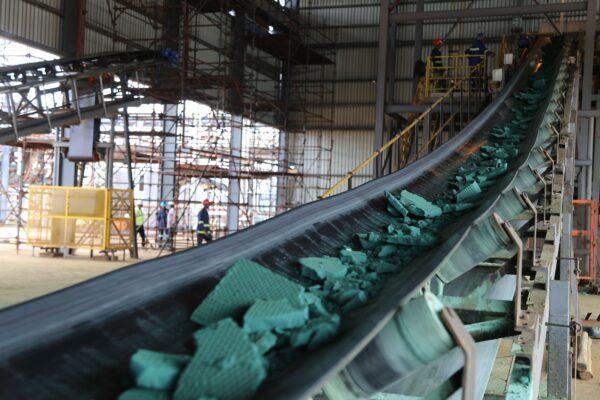A revealing podcast has again brought to light the problem of slavery at Chinese Communist Party (CCP)-owned cobalt mines in the Congo and the hypocrisy of green energy advocates.
He explained to Rogan the brutal connection between lithium battery powered devices and their source of origin in the CCP-controlled cobalt mines.
Cobalt is an essential rare earth mineral used in the manufacturing of almost all rechargeable batteries, including phones, iPads, smart watches, laptops, and electric vehicles.
Kara, who is an author and expert on modern-day slavery, human trafficking, and child labor, claimed that approximately 72 percent of the cobalt mined worldwide comes from the DRC.
The professor wrote about how slave labor and child labor are used to operate the CCP cobalt mines in Africa under appalling conditions.
Anti-Slavery Professor Calls Out ‘Green Movement’ And Big Tech
Kara called out the “Green Movement” over their claims they are fighting to “save the planet” by forcing the planet to drive EVs, which he found hypocritical in the light of the associated human rights violations.“Throughout the whole history of slavery … never in human history has there been more suffering that generated more profit and was linked to the lives of more people in the world … than what is happening in the Congo right now,” Kara said.
“Cobalt is in every single lithium, rechargeable battery manufactured in the world today. Every smartphone, every tablet, every laptop, and crucially every electric vehicle.”
He said that most consumers are unaware of the horrific abuses associated with cobalt mining industry, which is the prime source of the gadgets that are used in their everyday lives.
Tesla and Apple have previously vowed to crack down on human rights abuses and slavery in the cobalt supply chain, while Tesla’s Elon Musk promised to switch to a cobalt-free battery to power his electric cars.
African Laborers in CCP-Owned Cobalt Mines Work in ‘Subhuman,’ Slave-Like Conditions

Meanwhile, Kara slammed the CCP for exploiting the local African populations by having them labor in inhumane and “gut-wrenching” conditions, and for being totally indifferent towards the workers’ plight.
“Before anyone knew what was happening, [the] Chinese government [and] Chinese mining companies took control of almost all the big mines, and the local population has been displaced,” Kara told Rogan.
“They dig in absolutely subhuman, gut-wrenching conditions for a dollar a day, feeding cobalt up the supply chain into all the phones, all the tablets, and especially electric cars.”
“By and large, the world doesn’t know what’s happening … I don’t think people are aware of how horrible it is,” Kara added.The Chinese are heavily invested in the cobalt mines in the DRC, which provides 60 percent of Beijing’s cobalt and 70 percent of the global supply, reported Breitbart.
About 80 percent of the world’s cobalt processing occurs in communist China before being used to make lithium ion batteries.Breitbart also noted that the CCP Ministry of Public Security agents were present in the African nation to secure the CCP’s interests in Africa and protect Chinese nationals from the natives.
CCP-owned companies have spent billions of dollars buying out American and European miners to acquire control of the DRC cobalt mines over the past decade, seizing control of 15 out of 19 key mines in the country.
However, the relationship between the DRC and communist China has been increasingly strained lately, with local opposition to Chinese starting to rise.
Regional governors have shut down Chinese-controlled mines over contract and payment disputes with local authorities.US Returns to Invest in Africa’s Rare Earth Mines After Decade of Neglect
After years of neglect, the United States is now looking to return to secure rare earth metals and other crucial commodities in Central Africa, turning the continent into an economic battleground between the two powers.U.S. Secretary of State Tony Blinken recently signed a memorandum of understanding between the United States and the DRC and Zambia to boost ties between the nations to further develop the electric battery supply chain in order to pursue the administration’s green energy agenda.
“Global demand for critical minerals is going to skyrocket over the next decades,” Blinken said. “The plan to develop an electric battery supply chain opens the door for U.S. and like-minded investment to keep more value added in Africa.The United States also came to an agreement with the two African nations to address the various environmental abuses occurring in the country.





